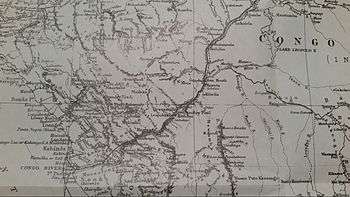Pool Malebo
| Pool Malebo | |
|---|---|
 Satellite image of the Pool Malebo; the capital cities of Brazzaville, ROC and Kinshasa, DRC are indicated. | |
| Coordinates | 4°16′55″S 15°29′19″E / 4.28194°S 15.48861°ECoordinates: 4°16′55″S 15°29′19″E / 4.28194°S 15.48861°E |
| Lake type | Fluvial |
| Primary inflows | Congo River |
| Primary outflows | Congo River |
| Surface elevation | 900 ft (270 m) |
| Islands | Mbamu |
| Settlements | Kinshasa, Brazzaville |
The Pool Malebo,formerly Stanley Pool, also known as Lake Nkunda by local indigenous people in pre-colonial times, is a lake-like widening in the lower reaches of the Congo River.[1] The former name Stanley Pool was named after early European explorer and journalist Henry Morton Stanley.
Description


_pg751_Panorama_du_Stanley_Pool.jpg)
The Pool Malebo is about 35 km (22 mi) long, 23 km (14 mi) wide and 500 km2 in surface area. Its central part is occupied by M'Bamou or Bamu Island[1] (180 km2), which is Republic of the Congo territory. The pool is shallow with depths of 3–10 m, while water levels vary by as much as 3 m over the course of a year at an average altitude of 272 m (900 ft).
Geography
The capitals of the Democratic Republic of the Congo and the Republic of the Congo—Kinshasa and Brazzaville, respectively—are located on opposite shores of Pool Malebo. These are the two closest capital cities in the world (other than Rome, Italy and Vatican City, which are actually contiguous).
The Pool is the beginning of the navigable part of the Congo River upstream to the cities of Mbandaka, Kisangani and Bangui. Downstream, the river descends hundreds of meters in a series of rapids known as the Livingstone Falls[2]:Vol.Two,255 to reach sea level at the port of Boma after a trajectory of 300 km.
Ecology
Flora
There are many palm and papyrus swamps along the edges of the river and pool, and often movement of floating mats of Eichhornia plants.[3]
Fauna
Fish
Most fish endemic to the area are catfishes, including the mountain catfish, L. brieni, Leptoglanis mandevillei, L. bouilloni and Atopochilus chabanaudi, an upside-down catfish.[3] The area has over 200 fish species documented, with Mormyrids as the most common with over 40 species, and with the highest diversification.[3]
References
- 1 2 "Malebo Pool". Encyclopædia Britannica. Accessed June 2011.
- ↑ Stanley, H.M., 1899, Through the Dark Continent, London: G. Newnes, Vol. One ISBN 0486256677, Vol. Two ISBN 0486256685
- 1 2 3 "Malebo Pool". Freshwater Ecoregions of the World. The Nature Conservancy. Accessed June 2011.
| Wikimedia Commons has media related to Pool Malebo. |